Are you feeling fuller after eating than you used to, or are you often bloated? While these symptoms could mean a lot of things, they are some of the common signs of gastroparesis, a condition marked by partial paralysis of the stomach, which leads to difficulties emptying food in a normal way. This condition is rare, affecting only 10 men and 40 women out of 100,000, but it can become serious and can lead to other issues, such as anorexia or diabetes. Gastroparesis can sometimes be mistaken for an ulcer, heartburn, acid reflux, or an allergic reaction, so it is important to know what symptoms to look for; recognizing this rare condition and getting it diagnosed and treated can help avoid potentially deadly complications.
Gastroparesis Defined

Gastroparesis, also called gastric stasis, affects the muscles of the stomach and prevents normal gastric emptying. Normally, your stomach walls work to grind food into smaller pieces and then pushes those pieces to the small intestine to continue digestion, but in those with gastroparesis, the muscles of the stomach walls work poorly or not at all, and digestion gets delayed. In some cases, if the food takes too long to digest, it will form into a solid mass called a bezoar, which can lead to nausea, vomiting, or worse.
Risk Factors/Causes
In most cases, doctors do not know what causes this rare condition; when it occurs without a known cause, it is referred to as idiopathic gastroparesis. Women are at higher risk of developing idiopathic gastroparesis: approximately 80% of cases are diagnosed in women. You are also more likely to develop gastroparesis if you:
- Have diabetes- this is the most common known underlying cause of gastroparesis. Diabetes can damage nerves, including the vagus nerve and nerves that control the muscles of the stomach and small intestine.
- Have had surgery on your stomach, small intestine, or esophagus, which damaged the vagus nerve.
- Have had radiation therapy.
- Are taking medications such as narcotics or antidepressants.
- Have certain autoimmune diseases such as scleroderma, a connective tissue disorder that affects the skin, blood vessels, and internal organs.
- Have hypothyroidism.
- Have had viral infections of your stomach.
Symptoms To Look For

Gastroparesis is often confused with ulcers or heartburn because some of the symptoms are similar, including:
- Nausea
- Vomiting
- Bloating
- Excess gas
- Chronic stomach pain
- Poor blood sugar control
- Poor appetite
- Weight loss
- Feeling full soon after starting a meal
- Feeling full long after finishing a meal
- Heartburn or gastroesophageal reflux (backup of stomach contents into your esophagus)
Complications of Gastroparesis
Gastroparesis can lead to a number of other issues, including:
- Growth of bacteria due to fermentation of food in the stomach.
- Bezoars, or solid masses that keep food from passing to the small intestine.
- Dehydration due to constant vomiting.
- Malnutrition due to poor absorption of nutrients.
- Blood glucose, or blood sugar, levels that are harder to control.
- Losing weight without trying, leading to anorexia.
- Decrease in quality of life.
How Is Gastroparesis Diagnosed?
Doctors will diagnose gastroparesis based on your medical history, symptoms, and the results of a physical exam and medical tests – testing is necessary to rule out the common misdiagnosis of acid reflux, heartburn, or an ulcer. During your physical exam, your doctor will listen for “succession splash,” meaning they will gently shake you and then listen for the sounds of fluid in your body. They will also check for any stomach tenderness, pain, and signs of dehydration or malnutrition.
Doctors can also request lab tests to help rule out any underlying conditions, such as inflammation, infection, and high or low blood glucose levels. They can also conduct a urine test to show signs of diabetes, dehydration, infection and kidney problems. Your doctor might run other tests, including:
- Endoscopy– An endoscope is put into your throat to check if there is an obstruction or blockage of the intestines.
- Upper gastrointestinal barium contrast radiography– After swallowing a contract solution called barium, an x-ray is taken to see if there are any delays in the liquid emptying from your stomach.
- Gastric Emptying Scintigraphy– The most commonly used test, in which you are given food that is labeled with a marker that can be seen by a scanner, allowing your doctor to follow the food as it travels through your intestines.
- Antroduodenal Manometry– This tests the muscles used to digest food. A catheter is inserted through your mouth and into the stomach, and is left there for 6 hours to measure muscular activity; after 6 hours you will eat a meal and your doctor will record the measurements of your gastric activity during digestion.
- Wireless Motility Study– This evaluates the time it takes for your stomach to empty. With this test, you are given a pill that collects data as it travels through your gastrointestinal system.
How Is It Treated?
Gastroparesis is a long-term condition, which means that treatment for this rare condition will not cure the disease, but can help manage it. There are ways to help control symptoms and manage the condition, including:
- Controlling your blood sugar levels if you are diabetic.
- Taking medications that can help strengthen muscle activity in the wall of your stomach.
- Changing your daily eating habits – for example, eating 6 small meals a day, so there is less food for your stomach to digest, avoiding foods that are high in fat and fiber, and focusing on ingesting liquids. For example, instead of eating an apple, opt for applesauce, which is easier to digest.
If nausea and vomiting continue after treatments, surgery can be done, including:
- Gastric electrical stimulation, in which a device that sends mild electric shocks to the stomach muscles is inserted into the abdomen to help control vomiting.
- Gastric bypass, in which surgeons create a small pouch at the top part of the stomach to limit the amount of food you can eat. This type of surgery is most appropriate for obese diabetic patients.
In extreme cases, your doctor might decide that a feeding tube is your best option to get a quick source of nutrients into your bloodstream.
When Should You See A Doctor?
You know yourself better than anyone, and if you are experiencing any of the above mentioned symptoms of dehydration, fatigue, bloating, or unexplained weight loss, you should seek help. Trust your gut! The sooner you seek help, the sooner you can manage the condition and improve your quality of life.
If you do need to seek help for a condition like gastroparesis, all of the lab tests, medications, and other diagnostic and treatment options can become pricey if you don’t have good health insurance coverage. Having the right plan is important, so come to EZ: one of our agents will compare plans in your area in minutes, get you more coverage, and save you as much money as possible. We will find a plan that provides the coverage you need and then some, for free. To get free instant quotes, simply enter your zip code in the bar above, or to speak to a licensed agent, call 888-350-1890.

